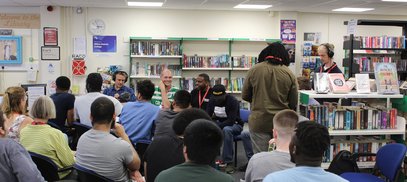The National Literacy Trust has secured two years of Government funding for an innovative scheme of work to engage people in prison with reading and writing outside of a formal education setting. The Literacy Innovation Fund is a key pledge delivered from the Prison Service’s landmark White Paper and sees a total of £720k awarded to the National Literacy Trust over the next two years.
Figures from the Ministry of Justice show that less than half of men in prison have the literacy levels expected of an 11-year-old. Our pilot scheme of literacy enrichment and engagement will offer crucial insights on how we can engage people in prison with possibly life-changing literacy activities, and provide evidence to inform the direction of literacy teaching through the new Prisoner Education Service.
The National Literacy Trust will be working in six prisons to offer accessible and inspiring literacy activities which respond directly to the needs of the people in each setting. Based on our experience and evidence on what actually engages people in prison with education and literacy, this new project will see the delivery of monthly events –including creative writing workshops, author panel events, and sessions on reading and writing with your child – as well as bespoke activities for small groups, literacy resources and book donations.
Outcomes from our existing criminal justice work consistently demonstrate the power of reading for enjoyment and creative writing – whether for yourself or to support a child –to raise confidence and inspire and improve wellbeing. Current participants of our New Chapters and Readconnect projects have said:
- “I felt like I belonged, was not judged, and could be myself in my writing.”
- “[New Chapters] made me feel like I'd have a second chance when released.”
- “The session has made me realise I want to write my own book about my life and how I have changed as a person.”
The National Literacy Trust believes that reading and writing for enjoyment have the power to transform a person’s relationship to literacy, and that everyone should have access to those opportunities. Our work in prisons embed key literacy skills – which include reading, writing, speaking and listening – at that same time as providing participants with safe, creative spaces in which they can write, share stories and discuss books. We have seen the incredible impact that this work can have, not only on people’s skills and desire to read and write more, but also on their wellbeing and relationships with peers. Negative experiences of formal learning, and exclusion from school, are common themes among people in prison, so we ensure that our activities are enjoyable, inspiring and accessible to all. We are absolutely thrilled that the Literacy Innovation Fund will give us the opportunity to expand this much-needed work.
Rebecca Perry, Head of Criminal Justice and Adult Literacy
